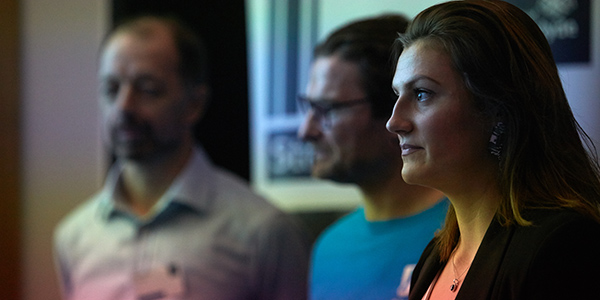Alan Feighery is the Start Up Manager at Strathclyde Inspire, the University of Strathclyde’s entrepreneurship initiative. He provides business support to entrepreneurial Strathclyders to realise their full potential.
It might be handy to say that entrepreneurs just ‘look’ more alert, brighter or more adventurous than the rest of the population – but even that isn’t always true.
Genuine entrepreneurs inhabit every demographic imaginable. Even starting a business is not a sufficient differentiator for the title, since not all businesses are entrepreneurial and not all entrepreneurs start businesses. But before I go any further, let me stress that there ARE shared entrepreneurial characteristics and that these are important, since they tend to be the things that investors look for.
Common entrepreneurial characteristics
In 7 years of working with University students, alumni and staff (each one armed with intelligence and at least one great idea), I have met some outstanding people.
I tend to meet people at the conceptual stage of a business idea; when they might have created something marvellously innovative but don’t realise that the initial idea is only the start of the commercialisation process; or those who are focused on becoming mega-rich and want to know the fastest golden ticket to that destination.
The former out-number the latter by about fifty to one, which is just as well, since if becoming mega-rich was as easy as buying a ticket (the odd National Lottery winner excepted) then why would anyone graft as hard as most start-up founders generally do?
I think of would-be entrepreneurs as “Dreamers”, but more in the Martin Luther King sense than through any negative interpretation. They are people who are looking to the future. People who have the potential to change things for the better; from improving a single process to innovation at a global level. This might include creating sustainable foods, novel drug delivery systems or innumerable other ways of making the world a better place.

It is always a pleasure to point out that there is no Right Way to innovate – just ways which lead to success against the business’ priorities.

Commitment levels can be an indicator of success
Lack of confidence and lack of resources are certainly common attributes. How can you know your idea represents a genuine business start-up / spinout opportunity if it’s never been done before and you don’t currently have the means to put it into practice?
That’s where Strathclyde Inspire comes in. As part of a diversified team, we offer students, staff and alumni advice, support, contacts and funding - as well as the chance to articulate their ideas and challenges out loud to interested and experienced ears.
Some Dreamers are genuinely surprised then at the extent of work which may be required to turn their idea into a business opportunity and commercial reality. Rather than being enthused by possibilities, they can be put off by the lack of a “quick fix”, or existing infrastructure to take their idea and run with it.
Sadly, these are ones most likely to fall at the first hurdle, on the basis that a good idea needs nurturing/entrepreneurial process if it’s to grow.
Intellectual Dreamers may not lack the commitment to move forwards but can hobble their own success by failing to explore commercial opportunities. They prefer to stick within the confines of the intellectual world and may be reluctant to step outside their comfort zone.
Intellectual Dreamers may still benefit from their innovation, as long as they have been careful to register their intellectual property (IP) at an appropriate stage, but may not be the ones best suited to taking an idea onwards towards commercial success.
Giveaways here, for me, are would-be-entrepreneurs who return to me, often several times, having reformatted their initial document or expanded a spreadsheet - without demonstrating that they have truly taken feedback on board. The motivation to “do whatever it takes” triumphs over latent potential pretty much every time, in my experience.
The enthusiastic Dreamer is a more welcome sight, even when their energy levels see them bouncing around my desk and sending copious amounts of emails, often through the night when they ought to be asleep, requesting feedback on one or another brainwave.
These Dreamers actively seek engagement and have the motivation, both to move their ideas forwards and to acquire the additional skills necessary to succeed. They tend to be better networkers and are constantly seeking information on possible opportunities, as well as feedback on pitches, plans, competition or funding applications, introductions to experts, early grant funding support……
I feel confident around such budding entrepreneurs as their energy often travels like a wave, sweeping away setbacks and challenges through sheer force of nature.
There is of course a different iteration of this type of entrepreneur – the Understated Dreamer, who has often achieved a lot already, under their own steam, but who almost feels unworthy of the title ‘entrepreneur’.
I love meeting this type and holding up a mirror to their achievements and potential. Sometimes, the difficulties they have already faced and overcome have left them feeling that they are “not qualified” or “not doing it right” in some way. It is always a pleasure to point out that there is no Right Way to innovate – just ways which lead to success against the business’ priorities.
Very often, a few introductions, external ideas or support is all these entrepreneurs need to fly even higher.
The ‘born’ entrepreneur
I’m often asked if this type actually exists and, in my experience, successful entrepreneurs can be both born and made. Regardless, either will still benefit from the network, expertise and support available within a specialist initiative such as Strathclyde Inspire.
Working independently may feel fulfilling and admirable but no smart entrepreneur ignores free resources.
Bill Aulet at MIT describes ‘Heart (motivation), Head & Hand (can be learned) and Home (community)’ as being necessary for all entrepreneurs.
Entrepreneurial characteristics
Regardless of their personality type, there are certain things which reassure me that an entrepreneur has a good chance of staying the course, when they first approach Strathclyde Inspire.
• They have done initial research into their idea to prove it has merit
• They have a nominal plan of how to move their idea off first base, even if they have not yet achieved it
• They are keen to listen – and to argue – about the way ahead
• They make one thing (or one meeting) to lead to another by constantly pursuing opportunities
With this foundation, I have had the privilege for several years of watching successful entrepreneurs take increasing ownership over their own ‘To Do’ list.
Over time, the support relationship moves away from informing, unlocking and enabling to becoming more of a “critical friend”, providing feedback on what the entrepreneur is proactively doing under their own steam; challenging their thinking; encouraging them to consider other viewpoints; keeping an eye on the bigger picture and providing feedback on plans, funding applications etc.
For me, and for my specialist colleagues and partners at Strathclyde Inspire, this is when our support becomes fully bespoke to the entrepreneur and the opportunity that they are developing.
It’s also the time when we share the very great privilege of watching innovation bear fruit - and the recognition that entrepreneurs rock.

Strathclyde Inspire (SI) actively pursues the beneficial societal and environmental impact which flows from having an entrepreneurial mindset - and from the creation of sustainable businesses.
It acts as an information and resourcing hub, providing IP, commercialisation, start-up and growth advice, support, funding and investment. Strathclyde Inspire also brings industry, funders and entrepreneurial thinkers closer together through its many partnership activities.
For further information, visit Strathclyde Inspire.

Strathclyde Inspire 100
Network connecting emerging and experienced entrepreneurs.